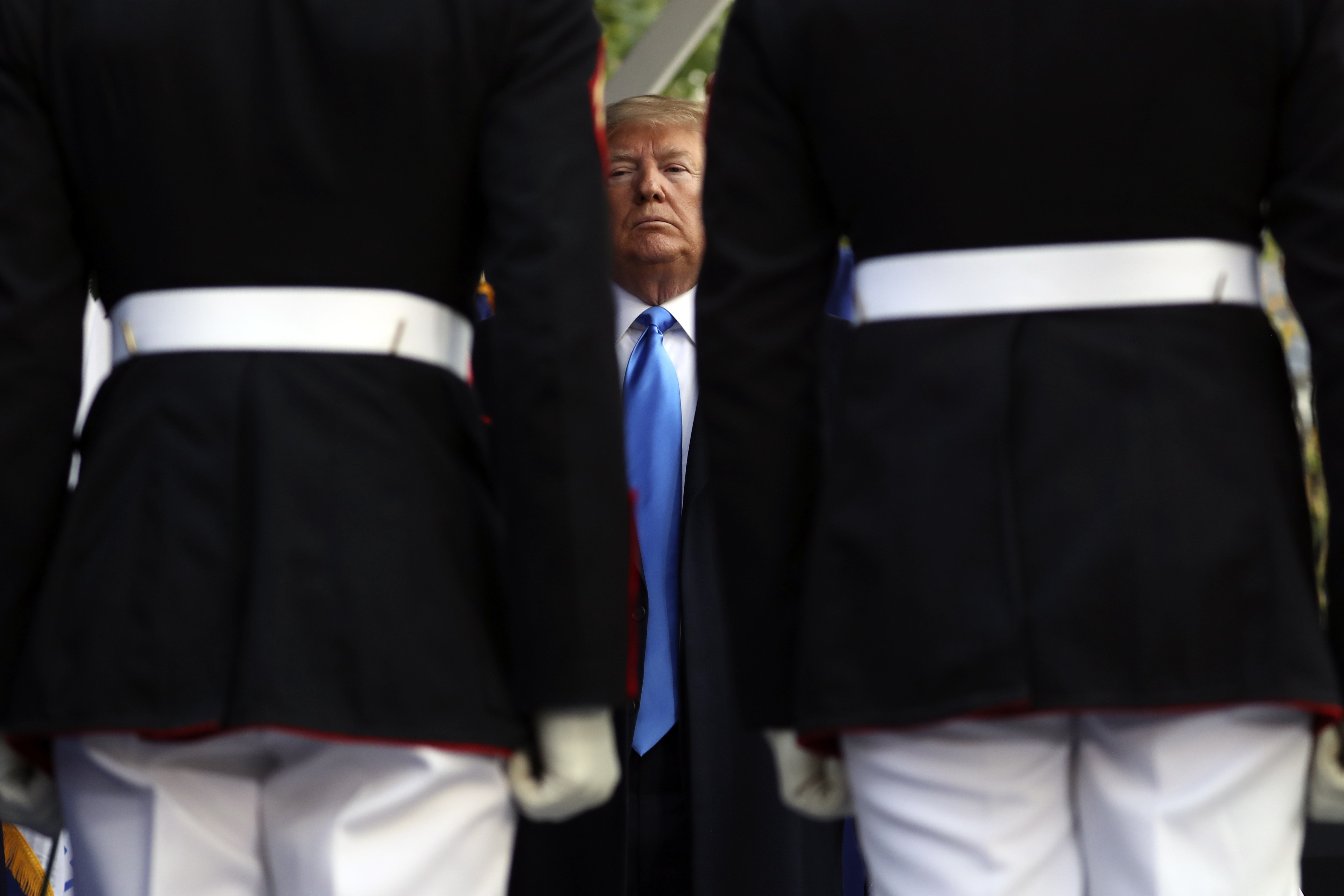
Just before Washington shut down for the holidays, President Donald Trump signed a massive $738 billion defense spending bill that passed both the House and Senate with overwhelming support from both Republican and Democratic lawmakers. The 2020 National Defense Authorization Act (NDAA) covers military spending through Sept. 30 of next year and ups the Pentagon budget by a whopping $22 billion over last year’s total.
A big prize for Trump is money for his campaign to militarize the heavens—“Space Force.” It also gives the administration freedom to continue backing the deadly Saudi campaign in Yemen and passes on a chance to repeal the open-ended authorization for endless war that started with Iraq in 2002.
Last week, the House of Representatives approved the measure by an overwhelming margin—377 to 48. The lopsided result was repeated in the Senate, with 86 members giving the thumbs-up and only 8 voting no. Negotiations over the war budget had stretched on for months, with border wall funding a key sticking point. The wall, another pet project of Trump’s, threatened to derail funding for the U.S. military machine. But to avoid that outcome, the wall money debate was kicked over to other spending bills.

Upon news that the Senate had agreed to the conference version of the bill, the president expressed his satisfaction, tweeting: “Wow! All of our priorities have made it into the final NDAA… Congress—don’t delay this anymore!”
Dominance over land, sea, air, and space
Trump’s Space Force, which has earned ridicule for the science fiction notions it evokes, is actually quite serious business. “It is not enough to merely have an American presence in space,” Trump told the National Space Council last summer. “We must have American dominance in space.”
While the idea may have the rhetorical trappings of a Galactic Empire, it is part of an international race to extend military control beyond Earth’s atmosphere that involves a number of big countries. Both Russia and China have divisions in their militaries devoted to a similar purpose, but Trump has made a beefed-up Space Command a central part of his agenda. It takes a page from President Ronald Reagan’s scuttled 1980s “Star Wars” plan to put nuclear weapons and bomb-killing lasers into orbit.
Under international law, it’s also illegal. The 1967 United Nations Outer Space Treaty, signed by the U.S., the Soviet Union, and China, pledge to reserve space for only peaceful exploration and scientific research. That agreement is now being totally ignored.
The NDAA makes the creation of Space Force official, with the new division to be housed under the Air Force and headed by a “Chief of Space Operations.” Sen. James Inhofe, the Republican head of the Armed Services Committee, says Space Force will “help protect and ensure America’s dominance in this warfighting domain for years to come.”
Expanding war into outer space is not the only thing funded by this gargantuan war budget, though. There is plenty of pork for all segments of the military-industrial complex. The Pentagon gets $635 billion for its core funding, the Energy Department scores $23.1 billion for nuclear weapons programs, and another $71.5 billion is allocated to general war operations.
The profits of the Lockheed Martin corporation will be getting a boost. The Pentagon had asked for money to buy 78 F-35 fighter jets from the company, but Congress did them better, handing over $9 billion to buy 90 planes instead. Boeing gets a boost to its bottom line, as money for eight of its super fighter jets, the F-15EX, was also added. Another $23 billion in cash is sunk into the U.S. Navy for the construction of 12 new warships, including three destroyers and two attack submarines.
Bi-partisan war budget
While near unanimous Republican support was a foregone conclusion, the number of Democratic lawmakers who signed on to back the measure has become a major point of criticism from peace activists, anti-war groups, and some progressive lawmakers.
Code Pink said the U.S. Congress let down the Yemeni people. “What could have been an opportunity to curtail Saudi Arabia’s violent war on Yemen has sadly turned out to be another bill created to fund war,” the group stated in a public post. Calling the NDAA “atrocious,” it expressed disappointment that only 56 members in the entire Congress stood in opposition.
Rep. Ro Khanna, D-Calif., was the most outspoken critic during debate on the House floor. Hitting back at fellow Democrat Rep. Adam Smith of Washington, who had characterized the NDAA as “the most progressive defense bill we have passed in decades” because of its inclusion of paid parental leave for federal workers, Khanna charged that “there are many things you can call the bill, but it’s Orwellian to call it progressive.”
Smith was one of those who maneuvered to get 12 weeks of paid parental leave tacked onto the bill, a win celebrated by the American Federation of Government Employees union. Khanna stuck to the war budget’s central elements in his critique, however, pointing out that it represents a $120 billion increase from the last defense appropriation of the Obama administration, which was already astronomically high.

He laid out a number of things that the American people actually need which could have been funded with that much money. Khanna said that the differential could fund college education for all or extend affordable high-speed internet access across the whole country. He also criticized his fellow Democrats for agreeing to strip amendments that would have blocked the war in Yemen or any campaign against Iran.
“We can’t just rhetorically give standing ovations when the president says we’re going to end ‘endless wars’ and continue to vote to fund them,” Khanna said.
Rep. Barbara Lee, D-Calif., saw her amendment repealing the 2002 Iraq Authorization for Use of Military Force (AUMF)—the law which handed President George W. Bush the power to wage war without end—also stripped from the final NDAA. Lee was the only member of Congress to vote against the original AUMF, which she has called “a blank check to the president to attack anyone.”
Concerning her position on the bill, Sen. Elizabeth Warren, D-Mass., tweeted, “The Pentagon’s budget has been too large for too long. I cannot support a defense bill that’s a $738 billion Christmas present to giant defense contractors and undermines our values and security.”
Sen. Bernie Sanders, Ind.-Vt. said in a Washington Post op-ed earlier this week that he found the whole debate around the war budget “ironic.”
“When I and other progressive members of Congress propose legislation to address the many unmet needs of workers, the elderly, the children, the sick, and the poor, we are invariably asked, ‘How will we pay for it?’ Yet we rarely hear that question with regard to huge increases in military spending, tax breaks for billionaires, or massive subsidies for the fossil fuel industry.”










